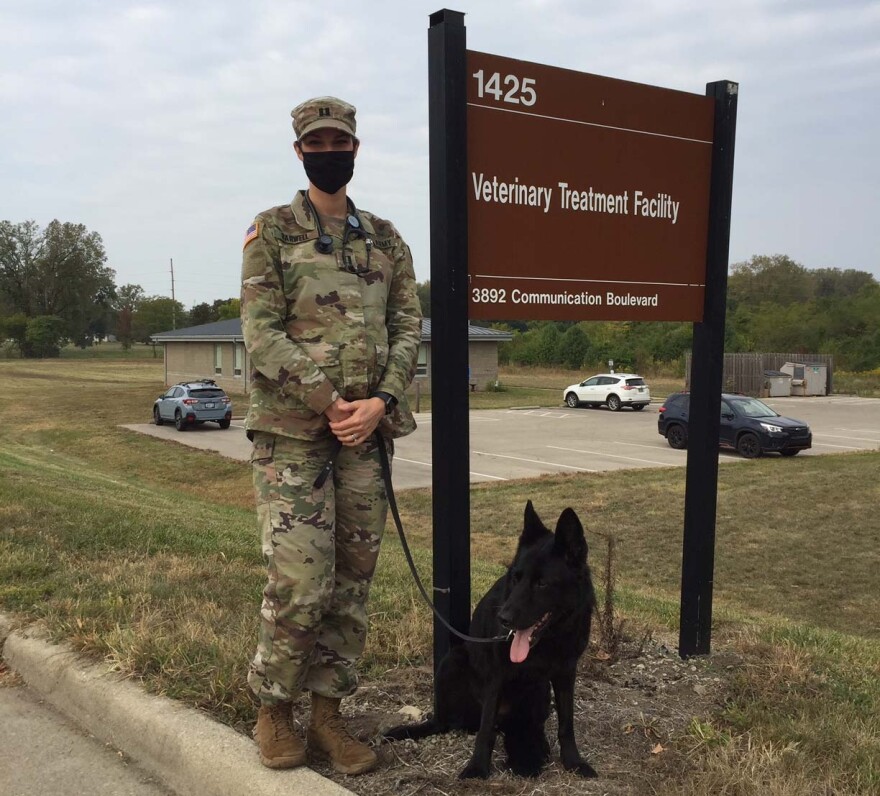Army Capt. Casey Barwell is the new veterinary branch chief at Wright-Patterson Air Force Base. She and the staff she oversees provide veterinary care for the base’s military working dogs. In this interview, Dr. Barwell talks to WYSO’s Jerry Kenney about taking on the job during a pandemic, her background, and a day in the life of a military working dog.
Transcript (edited lightly for length and clarity)
Captain Barwell: Depending on where they're stationed, they may have different duties, and each individual dog, too, has different things that they're trained on. So, military working dogs can be trained in explosives and patrol, which is kind of like attack dog. And then they can also be a drug trained dog. They may be dual purpose, so they're trained in two of those things. Usually, it's one type of either explosives and patrol, or drug and patrol.
Occasionally you'll have a single purpose dog and a lot of times those dogs are Labradors or other breeds that you might not stereotypically think of as a working dog. I guess their typical day would be their training or working either at the gate or on little missions around either the country or overseas as well.
Jerry Kenney: So pretty important work being done. How many dogs live on the facility?
CB: At Wright-Patt, we just have seven.
JK: And tell us about your role as veterinary branch chief at Wright-Patt.
CB: As the veterinary chief here, have several different types of jobs. So, clinically, we care for both pets and the military working dogs, so we care for active-duty members, service members that have retired or National Guard and reservists. We care for all their personal pets. So, we do that along with the military working dogs. On top of that, my responsibility, too, is just the function of the clinic, so any type of management responsibility falls back onto me as well.
Of course, any military training is another thing that is required for me to oversee and that can be training with our own soldiers, but it can also extend to the military working dog handlers, teaching them veterinary practices if they're on the front lines with their dogs and they need to give that initial care to them. And we also do training with human providers to help teach them about canine anatomy in case that they were put in a position on the front lines that they would [or] might have to care for a working dog as well. In addition to that, we also do food protection and public health. There's a lot of different facets that's covered as a Veterinary Corps officer.
JK: You've been on the job since July. What's been your experience so far?
CB: [The] Experience has been great. It's been a little different just with COVID. So we have put into place, you know, protective measures to keep everybody as healthy as possible. So since I've been here in July, we've been doing our curbside service for privately owned animals. Primarily owners will stay out in the car while we bring their pets in and do the services for them.
But we have stayed consistently busy and we're excited that we are now restarting our surgical and dental services as well as of this month. So that's, that's a bonus, and we haven't done those services since the start of covid. So, we're slowly transitioning back to our new normal.
JK: You grew up in Ohio and graduated from Ohio State. Was there anything about growing up in Ohio that led you to veterinary work?
CB: I didn't live in the rural part of Ohio, so I never necessarily had exposure to, like, farm animals, that kind of thing as a young child, but just our family pets growing up, I think is really what led me to my passion in working with animals. I do have family members that were in the military so when I ultimately decided to join ROTC back in college, I kind of put the two and two together of veterinarian and my passion for serving our country together and [it] has led me down this great career path.
JK: Army Captain Dr Casey Barwell, thank you so much for your time and the information.
CB: No problem. Thanks for joining me today.


